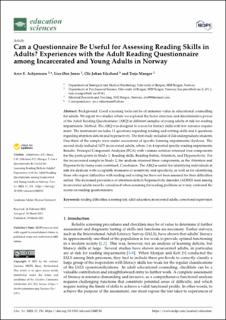| dc.contributor.author | Asbjørnsen, Arve Egil | |
| dc.contributor.author | Jones, Lise Øen | |
| dc.contributor.author | Eikeland, Ole-Johan | |
| dc.contributor.author | Manger, Terje | |
| dc.date.accessioned | 2022-01-24T10:19:51Z | |
| dc.date.available | 2022-01-24T10:19:51Z | |
| dc.date.created | 2021-05-26T15:11:30Z | |
| dc.date.issued | 2021 | |
| dc.identifier.issn | 2227-7102 | |
| dc.identifier.uri | https://hdl.handle.net/11250/2838899 | |
| dc.description.abstract | Background: Good screening tools can be of immense value in educational counselling for adults. We report two studies where we explored the factor structure and discriminative power of the Adult Reading Questionnaire (ARQ) in different samples of young adults at risk for reading impairments. Method: The ARQ was designed to screen for literacy skills with low resource requirement. The instrument includes 11 questions regarding reading and writing skills and 6 questions regarding attention deficits and hyperactivity. The first study included of 246 undergraduate students. One-third of the sample were under assessment of specific learning impairments/dyslexia. The second study included 1475 incarcerated adults, where 1 in 4 reported specific reading impairments. Results: Principal Component Analyses (PCA) with varimax rotation returned four components for the participants in Study 1: Reading skills, Reading habits, Attention, and Hyperactivity. For the incarcerated sample in Study 2, the analysis returned three components, as the Attention and Hyperactivity items were combined. Conclusion: The ARQ is useful for identifying individuals at risk for dyslexia with acceptable measures of sensitivity and specificity, as well as for identifying those who report difficulties with reading and writing but have not been assessed for their difficulties earlier. The increased prevalence of attention-deficit/hyperactivity disorder (ADHD) seen among incarcerated adults must be considered when screening for reading problems as it may confound the scores on reading questionnaires. | en_US |
| dc.language.iso | eng | en_US |
| dc.publisher | MDPI | en_US |
| dc.rights | Navngivelse 4.0 Internasjonal | * |
| dc.rights.uri | http://creativecommons.org/licenses/by/4.0/deed.no | * |
| dc.title | Can a Questionnaire Be Useful for Assessing Reading Skills in Adults? Experiences with the Adult Reading Questionnaire among Incarcerated and Young Adults in Norway | en_US |
| dc.type | Journal article | en_US |
| dc.type | Peer reviewed | en_US |
| dc.description.version | publishedVersion | en_US |
| dc.rights.holder | Copyright 2021 The Author(s) | en_US |
| dc.source.articlenumber | 154 | en_US |
| cristin.ispublished | true | |
| cristin.fulltext | original | |
| cristin.qualitycode | 1 | |
| dc.identifier.doi | 10.3390/educsci11040154 | |
| dc.identifier.cristin | 1912025 | |
| dc.source.journal | Education Sciences | en_US |
| dc.identifier.citation | Education Sciences. 2021, 11 (4), 154. | en_US |
| dc.source.volume | 11 | en_US |
| dc.source.issue | 4 | en_US |

